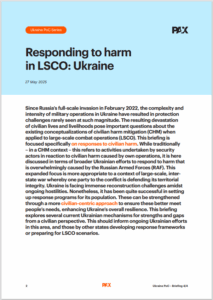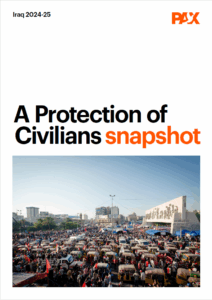Partners in Iraq and South Sudan kick off new programming
The PAX Protection of Civilians (PoC) team received a generous grant for its programming from the Dutch Ministry of Foreign Affairs, starting September 2019 until December 2023. Following the inception meeting the team had with the heads of all partners in the programme, namely: the Stimson Centre from the US; the Assistance Mission for Africa (AMA) from South Sudan; and, the Iraqi Al-Amal Association (IAA) and the Iraqi Al-Firdaws Society from Iraq, in January 2020, the Human Security Survey (HSS) teams from both Iraq and South Sudan also had in-country inception meetings involving more partner staff, to make sure that this new phase of programming is more inclusive and bottom-up.*
Iraq: need for improved community engagement
In February, the HSS Iraq Project Lead and the Senior Data Analyst travelled to Iraq, where the Senior Field Officer (HSS – Iraq) and partner staff from both IAA and Al-Firdaws joined for a two-day inception meeting in Erbil. It was great to have teams from all three of the current HSS locations: Basra, Kirkuk and Salahaddin, all around the table together.
At the survey level it was shared that we still need to be very cognizant of the sensitivities in how certain terminology is translated in Arabic, and how certain questions are asked. For instance, in terms of translations, the human part of the HSS needs to be highlighted more than the security part, as this can be tricky when trying to ask for governmental approvals to start the surveying, and still cause suspicion among civilians in a country ravaged by decades of war with multiple armed groups.
It was heartening to know that one of the strongest suggestions being echoed by partners was the need for improved community engagement, especially by engaging elected and appointed officials and decision makers at the governorate level. Now that the current partners in these locations are well-aware of the surveying techniques and methodology, and the survey tools have been developed and refined over the past three years, this new phase of programming can concentrate more efforts on the community engagement part, especially at the local level with civilians holding the local security actors to account.
Learning and adapting
Partners also shared that such meetings are useful for them to be able to engage with their counterparts in different governorates, so they can learn what is happening all around within the project, and also learn from each others’ successes and challenges. While learning and adapting our approach is a continuous process, we have also planned for annual learning meeting with partner staff from all governorates at the end of each year under this project.
This will allow us to take stock of what was achieved in the past year, and how we can refine our approach for programming in the next year- this is a part of the PoC teams ambitions towards learning and adapting programming.
Partners also expressed how they wanted to keep abreast of the work being done under the Engaging International Actors (EIA) and Protection in Practice (PiP) components of the entire PoC programme, and how the HSS have contributed to gains within these projects, showing that learning goes beyond just one project for our partners.
South Sudan: identifying security needs and priorities of communities
Following the inception meeting in Erbil, the HSS South Sudan Project Lead and the Senior Data Analyst travelled to Juba, where the Senior Project Officer (HSS – South Sudan), partner staff and members of the Community Security Committees (COMSECOMs) joined for a two-day inception meeting in Juba, South Sudan.
To learn from their counterparts in South Sudan, the two staffers from HSS – Iraq also joined.
Generally, the partners brought forward that the data collection was important to them in identifying the (security) needs and priorities the communities have in their area and that the data collection and validation process was useful with regards to general programming. Furthermore, the data collection has developed an interest and awareness among community members, and over time the granting of permission for data collection, enumerator trainings and community dialogues among local authorities has become easier as they grew to know and appreciate the project.
Translating key survey concepts to local contexts
While discussing the Planning, Monitoring, Evaluation and Learning (PMEL) component of these new phase of the HSS project, evaluation tools were suggested by the partners, such as evaluation forms for community dialogues, both by paper forms and by group hand-raising exercises in contexts where literacy levels could affect participation, in order to better measure our effectiveness. This is just one example of why involving partner staff in such meetings can bring about constructive new ways on how we do things.
Similar to Iraq, staff also discussed terminology being used in HSS project. Most terminologies were briefly discussed but the partners decided to keep them as they were, because they had become familiar to most project stakeholders involved and changing them would create confusion. To the terminology discussion two issues were added: the need to translate key survey concepts into the local languages in which surveys need to be conducted by enumerators (Dinka, Nuer, Bari, Acholi, possibly Juba Arabic) as well as the request to local partners to advise on the proper naming conventions of their particular states and counties, as this has changed repeatedly over the last years and this is always a hotly debated topic. Since initially 10 states grew to 28, later 32, and is now back to 10 states, this has created additional confusion and controversy.
The direct programmatic link between grassroots data collection and dialogue on the one hand (from HSS projects) and international advocacy on policy (a part of EIA) and international training efforts (a part of PiP) was new to the South Sudanese project partners and was generally welcomed with interest, same as was the case in Iraq.
Human Security Survey in two different yet similar countries
First and foremost, while engaging with the UN in-country is a crucial part of the HSS, in South Sudan the UN has an explicit Protection of Civilians mandate, while this is not the case in Iraq. This means that the level of engagement with the UN differs in both these contexts.
Discussions between HSS partners at inception meeting on March 6-7, 2020, in Juba, South Sudan.
Discussions between HSS partners at inception meeting on March 6-7, 2020, in Juba, South Sudan.
Second, in terms of the infrastructure available, the two countries also greatly differ – in Iraq, access is challenging because of security, while in South Sudan, access is challenging because of a lack of infrastructure. Similarly, the levels of cellular networks in both these countries also differ. In Iraq, we are able to get surveys on a daily basis during the data collection phase, whereas, in South Sudan, surveying devices (phones) have to be usually brought back to the partners’ office or compound (in the state capital) to upload the surveys to the server.
However, there are similarities in how in both countries, there are clear divisions along ethnic and tribal lines, and in the case of Iraq, also sectarian lines; while in South Sudan the conflicts have historically been along which ethnicity one belongs to, in Iraq, there have been visible conflict lines between the Arabs and Kurds, as well as along Shia’a and Sunni lines. While in Iraq, the insecurities were terrorism related when the HSS first started and are now related to the broader political climate and high levels of corruption, in South Sudan they evolved from the political climate which also had a stark ethnic element to it, to now more local level insecurity, especially around cattle raiding. Regardless of the sources of insecurity, it is the civilians who are bearing the brunt of the burden.
* When the inception meetings took place the coronavirus pandemic was in its early stage. The coronavirus has a tremendous impact on communities all over the world, including Iraq and South Sudan. An update on how COVID-19 impacts the situation and the work of our partners in Iraq, South Sudan and other areas will follow soon. For general updates on the impact of the coronavirus in conflict areas visit the PAX website.
About this news
Date of publication:
Mar 26, 2020
Author:
Saba Azeem and Anton Quist

